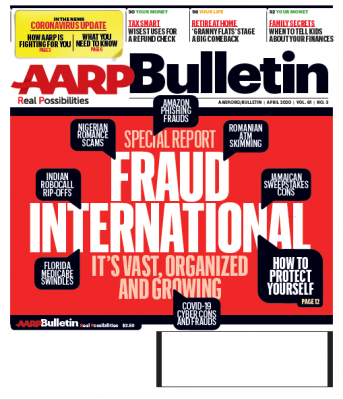April AARP Bulletin Special Report: The Vast, Organized and Growing Business of International Fraud
An In-Depth Look Into How Fraud Organizations Around the World Are Structured and How You Can Protect Yourself
WASHINGTON—Whether it’s the coronavirus, the upcoming election, a new Medicare policy, or any major development, professional fraud organizations are increasingly using the day’s news as opportunities to scam Americans, and particularly older Americans. In this month’s cover story, AARP Bulletin opens the curtains on the increasingly sophisticated, professional, international, and tech-savvy world of fraud.
This unique and deep AARP investigation reveals that the scammers of today are more organized and business-like than ever before. They use advanced technology to their advantage: that means that the call that shows up on your phone with a local area code and prefix might be originating in Florida, Jamaica, India, Eastern Europe, or even Africa. Using email addresses and phone numbers, often purchased in bulk from illegal list brokers, most fraud organizations can afford to play the numbers game. The more they pitch, the more they profit.
So, how do you protect yourself? Even sophisticated scams can be avoided as long as people remain skeptical, ask questions, and take precautionary measures to protect themselves from fraud. Read more about how scammers operate internationally in this month’s cover story.
Other stories in the April issue include:
Bulletin Brief on COVID-19:
- A Letter to Our Members: In a special message, CEO Jo Ann Jenkins assures members that AARP has been actively engaged on and monitoring the response to the COVID-19 pandemic. AARP is also making sure members and their families know how to protect themselves, for example by sharing extensive information in publications and online and convening top public health officials for tele-town halls.
In the News:
- A Q&A on COVID-19: In response to the pandemic and its effect on adults over 50, AARP asked Nancy Messonnier, M.D., Director of the Centers for Disease Control and Prevention’s National Center for Immunization and Respiratory Diseases, to answer questions on how older adults can deal with the situation. “If you’re 65 or older and live where cases have been reported, take action to reduce your exposure,” Messonnier says. “Know what’s going on locally. Pay attention to recommendations from your local health department.” She also discusses what older adults in assisted living or retirement communities should do and if it’s safe for loved ones or caregivers to visit older adults during this time.
- Medicare and the Elections: From now until Election Day, politicians across the spectrum will discuss the pros and cons of “Medicare for All.” However, it’s not yet clear how the current Medicare program would fit into Medicare for All. That’s why voters should ask their candidates how they plan to improve the program. Learn more about how this year’s elections could affect Medicare – and the four health care questions voters should consider – in our Special Report.
- The Future of Medicaid: Medicaid, the $600 billion program that covers more than 72 million Americans, could undergo drastic changes depending on the outcomes of these upcoming elections. Will more states join the 37 that have chosen to expand the program? Or, will states side with the Trump administration’s proposal to implement block grants that would cap how much is spent on Medicaid? The politicians that voters elect to the White House and Congress will determine how low-income Americans get health care for years to come.
Your Life:
- Aging in Place: Granny flats are making a comeback. The tiny housing units located in the backyards of many suburban homes were popular in post-World War II America until zoning laws stopped their construction. Today, many states are passing laws to remove restrictions on accessory dwelling units (ADUs), giving people more options for aging in place. Learn more about the benefits of ADUs in this month’s issue.
More information is at: http://www.aarp.org/bulletin/.
###
About AARP
AARP is the nation’s largest nonprofit, nonpartisan organization dedicated to empowering people 50 and older to choose how they live as they age. With a nationwide presence and nearly 38 million members, AARP strengthens communities and advocates for what matters most to families: health security, financial stability and personal fulfillment. AARP also produces the nation's largest circulation publications: AARP The Magazine and AARP Bulletin. To learn more, visit www.aarp.org or follow @AARP and @AARPadvocates on social media.
































































